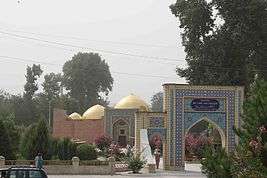Mir Sayyid Ali Hamadani
| Mir Sayyid Ali Hamadani | |
|---|---|
| میر سید علی ہمدانی | |
| Personal | |
| Born |
714 AH (1314 AD) Hamedan, Persia |
| Died |
786 AH (1384 AD) Kunar, Persia |
Mir Sayyid Ali Hamadani (Persian: میر سید علی ہمدانی; 1314–1384) was a Persian Sūfī of the Kubrāwī order, a poet and a prominent Shafi'i Muslim scholar.[1][2] He was born in Hamadan,[3] and was buried in Khatlan.[4] He played a major role in spreading Islam in Kashmir and he has also influenced the culture of the Kashmir valley.[5] He was known as Shāh-e-Hamadān ("King of Hamadān") and Amīr-i Kabīr ("the Great Commander") and Ali Sani ("second Ali")[6]. In his young age he spent few years under the tutelage of Ala ud-Daula Simnani a famous Kubrawi saint based in Semnan, Iran[7]
Death

There is a belief that Hamadani died at Wafat Gah, a graveyard near Nokot village in modern Mansehra District, Pakistan.[8][9] His body was carried by his disciples to Khatlan, Tajikistan, where his shrine is located.
Impact on Kashmiri craft
Traditionally, Hamadani is regarded as the founder of weaving craft in Kashmir. It is said that he brought with him 700 weavers who taught the craft of making cashmere wool and pashmina to the local population.[10]
Works
- Zakhirat-ul-Muluk on islamic law ,[3]
- Al-Burda Qasidat, Sherah
- Risalah Nooriyah, is a tract on contemplation.[3]
- Risalah Maktubaat, contains Amir-i-Kabir’s letter.[3]
- Dur Mu’rifati Surat wa Sirat-i-Insaan, discusses the bodily and moral features of man.[3]
- Dur Haqaa’iki Tawbah, deals with the real nature of penitence.[3]
- Hallil Nususi allal Fusus, a commentary on Ibn-ul-‘Arabi's Fusus-ul-Hikam.[3]
- Sharhi Qasidah Khamriyah Faridhiyah, is a commentary on the wine-qasidah of ‘Umar ibn ul-Fariz.[3]
- Risalatul Istalahaat, is a treatise on Sufic terms and expressions.[3]
- ‘ilmul Qiyafah is on physiognomy.[3]
- Dah Qa’idah gives ten rules of contemplative life.[3]
- Mawaddat al-Qurba|Kitabul Mawdah Fil Qurba, puts together traditions on affection among relatives.[3]
- Kitabus Sab’ina Fi Fadha’il Amiril Mu’minin, gives the seventy virtues of Hazrat ‘Ali.
- Arba’ina Amiriyah, is forty traditions on man’s future life.[3]
- Rawdhtul Firdaws, is an extract of a larger work entitled.[3]
- Firdawsul Akhyaar, by Shuja-ud-Din Shiruyah.[3]
- Manazilu Insaaliqin, is on Sufism.[3]
- Awraadul Fathiyyah, gives a conception of the unity of God and his attributes.[3]
References
- ↑ Al-islam.org
- ↑ Ninth Session, Part 2
- 1 2 3 4 5 6 7 8 9 10 11 12 13 14 15 16 17 Soqte:School Of Orthoepy Quran And Theology::Kashmir
- ↑ Hadith alThaqalayn || Imam Reza (A.S.) Network
- ↑ Soqte:School Of Orthoepy Quran And Theology::Kashmir
- ↑ The Valley of Kashmir by 'Sir Walter Roper Lawrence' 1895, page 292.(edit,), Jeelani Allaie
- ↑ 'Hayate Makhdoom Syed Ashraf Jahangir Semnani(1975), Second Edition(2017) ISBN 978-93-85295-54-6, Maktaba Jamia Ltd, Shamshad Market, Aligarh 202002,India.
- ↑ S.B. Panni, Tareekh i Hazara, 1969
- ↑ B.M. Qureshi, Sufis of Northern India, Pakistan and Kashmir, Lahore, 1987
- ↑ Jeelani Allaie (ed.), Shereza, page 32, Kashmir Academy Arts and Culture, 2004
External links
Bibliography
- John Renard 2005: Historical Dictionary of Sufism (Historical Dictionaries of Religions, Philosophies and Movements, 58), ISBN 0810853426
